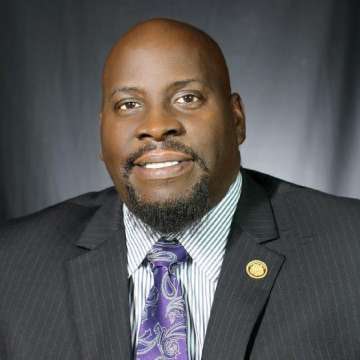During his first year as an undergraduate student at Truman State University, Dr. Dwayne Smith was approached by a White woman who asked what country he was from.
“I didn’t even get the question at first because I said I was from the United States,” says Smith, chief executive officer of Housatonic Community College. “Then, when I left, I thought, ‘Oh, she thought I was from another country, like I was an international student.’ I couldn’t be from America.”
Despite facing microaggressions, racist comments, as well as obstacles stemming from being a first-generation student, Smith always felt that he deserved to be a student at the institution.
 Dr. Dwayne Smith
Dr. Dwayne Smith“When I talk about success and being driven, you always have to believe that you deserve to be here like everyone else,” he says. “That no one would make you feel that you don’t belong” or this “space is not your place. You own your space and that’s what I did throughout the years.”
As a student leader and activist, Smith wanted to provide a place for students of color to feel connected to campus. He was eventually hired to be the institution’s minority counselor on campus.
“I knew [that] this was what my life was to be about,” he says.
He went on to become associate dean of multicultural affairs, a position in which he established the school’s first diversity department.
After holding positions at the University of Missouri, Park University and Avila University, Smith became provost and vice president for academic affairs at Harris-Stowe State University.
During his time at Harris-Stowe, Smith focused on increasing opportunities within the science, technology, engineering and mathematic (STEM) fields. He secured over $12 million in external funding, including a $5 million grant from the National Science Foundation. Additionally, the number of degree offerings increased by more than 75%, according to the institution.
Additionally, Harris-Stowe was ranked in the top 40 in the nation in graduating African Americans in education as well as the top 50 nationally in graduating African Americans in mathematics and statistics, the university reported.
“I had a nice ride there,” says Smith. “Of course, we had challenges at the institution being an under-resourced and underfunded HBCU in the state of Missouri. But we were able to do some incredible work.”
After 14 years at Harris-Stowe, Smith’s interest shifted to community colleges. His “affinity” for community colleges stemmed from his educational vision of access and opportunity as well as a focus on student success and completion rates.
In July, Smith began his new role as CEO of Housatonic Community College.
“I’m just truly fortunate that I’m able to have a second chapter of my career doing something totally different,” he says. “But I’m still excited as if it was my first day starting higher education.”
In his new role, Smith plans to learn the culture of the institution and engage the Bridgeport, Connecticut community to support Housatonic initiatives.
His goal is to also advance the mission of Housatonic, which is to “provide wonderful and outstanding educational opportunities for the population” and “to be a beacon of hope and a beacon of light for individuals who are seeking post-secondary credentials,” Smith says.
In addition to his administrative roles, Smith serves as board chair of the Higher Education Consortium and chairman of the board of NewPot Solutions Charitable Foundation.
He has also received a number of accolades such as the Chair Academy International Exemplary Leadership Award, the Missouri Association of College Personnel Richard Caple Award and the Truman State University Distinguished Service Alumni Award.
Throughout his 36-year higher education career, Smith says he has enjoyed commencement ceremonies because “you see the fruits of your labor manifesting with individuals earning a college degree.”
“Freshman year, you see this person with a lot of promise,” he says. “And then four to five years later, you see them as this outstanding individual who’s ready and willing to tackle the world. For me, that’s a beautiful part about being in higher education — within four to five years, you see the manifestation of it, opposed to having to wait years and years to see it.”
Due to his own experiences, Smith has remained “optimistic about what education can do to equalize the playing field.”
“In spite of my poverty, I had to kind of move forward,” he adds. “In spite of the racism, I had to move forward. In spite of being poor and being invisible, I had to press my way through.”
This article originally appeared in the August 6, 2020 edition of Diverse. You can find it here.


![Mentor Mentee [60287]](https://img.diverseeducation.com/files/base/diverse/all/image/2024/04/Mentor_mentee__60287_.662959db8fddb.png?auto=format%2Ccompress&fit=crop&h=100&q=70&w=100)


















